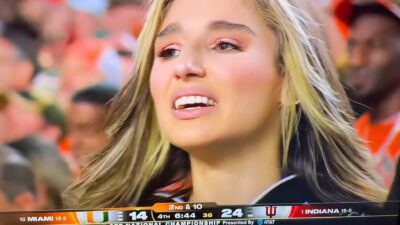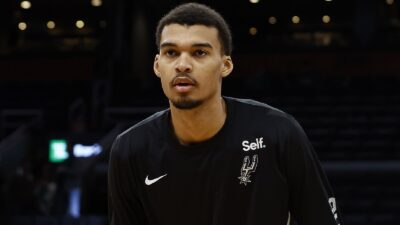
Tony Romo took the football world by storm when he joined the broadcast booth after retiring as a player and immediately showed off incredible skills. He was funny, did not take himself too seriously, and absolutely crushed with his ability to predict plays and be on top of game situations as they were unfolding. He was at the height of his abilities in the AFC Championship Game last season when he predicted a series of Patriots plays in a row.
That sort of broadcasting style is familiar to anyone who has watched Los Angeles Angels games on TV the last several years.
Since 2010, former MLB pitcher Mark Gubicza has teamed with Victor Rojas to form what I called the best announcing team in baseball. Gubicza is affable, humorous, and studies the game so well that he clues viewers into what to look for and often predicts what will happen, much like Romo.
PREDICTING PLAYS
The day we spoke for our phone interview last month, Gubicza foresaw a big hit coming for Mike Trout in the Angels’ game against the Boston Red Sox later that night.
When Trout came to bat in the sixth inning, Gubicza noted that Red Sox starter Rick Porcello had gotten the two-time MVP out on an inside pitch the previous at-bat. Gubie suggested that Trout should “cheat” by looking for a fastball on the inner part of the plate, knowing that Porcello was likely to try and go back to the same spot where he had success the previous at-bat. That’s exactly what Porcello did, and Trout was looking for it just as Gubie was. The result was Trout’s first career home run at Fenway Park, and a pretty cool moment for Gubicza.
— MLB News by LBS (@MLBNews_LBS) August 13, 2019
The day before, Gubicza and Rojas noted how Red Sox DH J.D. Martinez was letting pitches travel deep into the zone so he could hit them to the opposite field. Next thing you know, Martinez homered to the opposite field. In a game a week earlier, Gubie suggested Jaime Barria should go back to his fastball up-and-in two pitches before the Angels pitcher did so to get a strikeout.
Another fun example of Gubicza’s ability to predict pitches came during an Angels-Texas Rangers game early last year. Gubicza analyzed the game situation perfectly and figured Texas’ pitcher, Martin Perez, would take a risk with an open base by throwing a 3-2 changeup. Perez did exactly as Gubicza thought and got a strikeout.
"Open base here with a lefty on deck, I wouldn't be surprised if he threw a changeup here 3-2" – Mark Gubicza just calling Martin Perez's pitches Tony Romo style. @Markgubicza and @VictorRojas remain the best broadcast team in MLB @Angels pic.twitter.com/Jhk6C4FH88
— Larry Brown (@LBSports) April 11, 2018
His ability to predict things is remarkable.
How does Gubicza do it? What makes him able to see things well before it happens? It comes down to years of experience, and a serious dedication to studying the game.
STUDYING THE GAME AS IT’S UNFOLDING
Gubie, who pitched from 1984-1997 and made two All-Star teams, told me that he used to watch hitters between his starts. He began to look at where a batter’s hands were, how they were gripping the bat, if they were moving their feet, and whether they were confident based on their body language. He says he can look down from the broadcast booth to see all that.
“That determines for me where I’m going to guess ahead as far as what pitch should be thrown, what they’re going to try to do, and where the hitter is going to try to hit the ball,” Gubicza says.
“Hitters are like a walking library. Every at-bat, every swing, every pitch. Hitters, pitchers, fielders give you plenty of evidence. Am I right all the time? No, but before a pitch is thrown, I want to give the viewer an opportunity to look out for something rather than just say ‘wow, what a great swing.’ You can do that, but I’d rather be a risk-taker when it comes to that stuff.”
His approach of explaining things to the viewer stems from advice he received when he first began doing analysis for FOX.
“Scott Ackerson, who did the NFL on FOX pregame show, told me when you’re doing TV, don’t say ‘that was a great home run. We know that. We can see that. Explain to me why he was able to do that.’”
Few explain things better than Gubicza.
Watch an Angels game, and you won’t just hear him point out that the defense is playing in a shift based on a hitter’s tendency. What he’ll also tell you is how a pitcher can try to locate pitches based on where the defense is playing, in order to get the hitter to hit towards the shift.
Think the pitcher was just throwing a ball back to the umpire to get a cleaner one or one he can grip better? Maybe. Or maybe, as Gubicza suggested on a telecast during an Angels-Indians game, the pitcher was using it as a trick to reset the hitter’s eye level and focus towards a high pitch, because the pitcher intended to throw low on the next pitch.
Who thinks of this stuff? Who even knew any of this was possible, much less strategic? I didn’t, but Gubicza did, and now those who watch Angels games do too. And that’s all part of Gubicza’s mission as a broadcaster.
EDUCATE AND ENTERTAIN
“My theory is, and I learned this from way back in the day when I first started doing shows on FOX, my goal has always been: educate and entertain.”
He does both so well.
When discussing his analysis of hitters, Gubicza pointed out how some are difficult to pick up clues from, like Boston’s J.D. Martinez.
“A confident hitter doesn’t give you any information about what they’re looking for. They would basically be a tough guy to play Texas hold ‘em with,” Gubicza says.
The Texas hold ’em analogy is a perfect example of what makes Gubicza so good as a broadcaster. Though he has a wealth of knowledge and information, he doesn’t talk down to or over a viewer’s head; he is able to put things in terms that are understandable.
Gubie believes that he is able to relate things to fans well because it’s the style he grew up listening to.
“Growing up in Philly, I listened to every Phillies game on the radio while playing stickball — Harry Kalas and Richie Ashburn. Ashburn would put things in terms that fans were familiar with.”
For something simple like keys to the game, he has fun with it by choosing songs that relate to the situation or city the team is playing in. An afternoon game at Angel Stadium might result in a song called “Shadows” as a key, which is a nod to the difficulty for hitters dealing with the shadows on the field. A game in Seattle might result in a key that relates to a Pearl Jam song.
Gubicza and Rojas poke fun at each other and aren’t afraid to keep things light and fun. For an Angels game ahead of the team’s ’70s throwback weekend, the two dressed up in hilarious ’70s garb, complete with wigs and props. They had even more fun with their outfits the year before for ’80s weekend.
We are so ready for @Angels 80’s homestand #AtTheBigA !! Are you? #ParadiseCity!! It’s the @Angels vs @astros tonight on @FoxSportsWest pic.twitter.com/M590lWFbgO
— Mark Gubicza (@Markgubicza) August 25, 2018
That type of approach is imperative to keep viewers entertained, especially when calling games for a team that’s losing more games than they’re winning like the Angels this season.
HOURS OF PREPARATION
Gubicza’s preparation goes well beyond just studying the hitters, pitchers and fielders as he’s watching a game. He puts in hours of work every day to get ready for games.
The day we spoke, Gubicza was already at Fenway Park hours before the time of the first pitch. Gubicza says he watches several games through the MLB TV package to learn opposing players and their tendencies. Not only that, but he also reads articles and scours the internet to gobble up information about not just the Angels, but also the teams they are facing.
In addition to reading articles daily, Gubicza spends time researching advanced stats on sites like Fangraphs and Baseball Savant, which are hubs for high-level baseball data.
That’s why when Aaron Judge hit an opposite field home run against the Angels at Yankee Stadium last week, Gubicza wasn’t gushing over what’s often a rare accomplishment by a hitter. Instead, Gubie noted immediately that most of Judge’s home runs this season had gone to the opposite field. Furthermore, Gubicza pointed out the mechanical change Judge made to his stance that helped account for the improvement to the opposite field.
Analysis doesn’t get any better than that.
What’s truly remarkable is that Gubicza provides this type of information not just for the home team — as many local analysts do — but also for opponents. The result is a completely enriched broadcast.
“My wife asks, ‘why do you do so much?’ I tell her it’s because I’ve got six months off where I don’t have to do too much. For me, it would be a disservice to our viewers who are taking time out of their day not to give them the best information and product possible,” Gubicza says.
Though he has all this knowledge of advanced stats and player tendencies, Gubicza is not hitting you over the head with it; he only fits stats in where it belongs.
“Bottom line, the game is what you’re supposed to be talking about. You don’t want to regurgitate a bunch of numbers when it’s not related to what’s happening in that game. So you have the numbers, but then you let the game provide the information you need. You can’t just rely on what you’re reading and know the numbers; you have to rely on what you’re seeing that particular day and what you’re seeing on the field.”
Few combine the stats and storylines better than he does.
A GREATER CALLING?
Gubicza is so good at calling pitch sequences and recognizing pitcher and hitter strengths and weaknesses, I asked him whether he considered becoming a pitching coach for a team.
“So many times I’ve been asked about that,” Gubicza acknowledges. “I get my fix because I help coach a high school team in Southern California in fall and winter as much as possible. So that edge is satisfied, and I’m really happy with what I’m doing.”
When the Angels’ season ends, he’s still able to use his predictive powers to impress guests at his home. If his son has friends over to watch playoff games, the guests will often ask him to call pitches and are astounded by the accuracy.
As for the Romo comparison?
“He’s a likable human being and a risk-taker,” Gubicza says.
“If you’re not willing to say things and guess, then it’s not worth going out and doing what we’re doing.”













